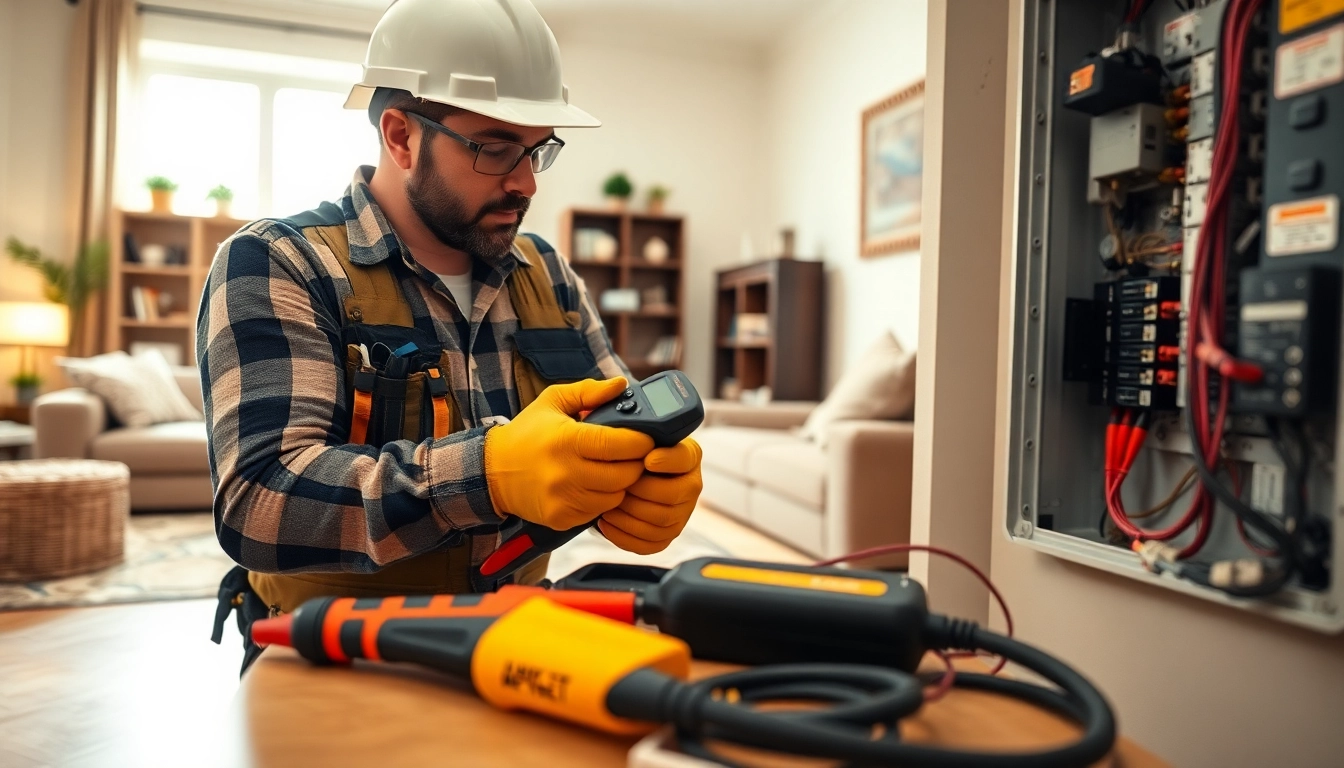Understanding the Electrician Profession
The role of an Electrician is vital within the framework of modern society, where electrical systems power nearly every aspect of our daily lives. From the homes we live in to the factories that produce goods and the hospitals that care for our health, electricians play a critical role in ensuring that electrical systems are installed correctly, maintained, and operate safely. In this comprehensive guide, we will explore the various dimensions of the electrician profession, including their responsibilities, required skills, educational paths, career opportunities, and best practices.
What is an Electrician?
An electrician is a skilled tradesperson who specializes in the electrical wiring of buildings, transmission lines, and related equipment. They are responsible for the installation, maintenance, and repair of electrical systems, including power distribution, communications, and lighting systems. Electricians may work in residential, commercial, or industrial settings, and often they are called upon to troubleshoot and resolve electrical issues.
Key Responsibilities of an Electrician
The responsibilities of an electrician vary depending on their specific role, but generally, they include:
- Installing Wiring and Equipment: Electricians install electrical systems, including wiring, circuits, and control systems within buildings.
- Maintenance and Repair: They perform routine maintenance checks and repair faulty systems, ensuring optimal performance and compliance with safety standards.
- Reading Blueprints: Electricians interpret technical drawings and schematics to identify system specifications and installation requirements.
- Compliance with Codes: They ensure all work complies with local, state, and national electrical codes and regulations.
- Safety Practices: Electricians prioritize safety, using protective equipment and following best practices to prevent accidents and injuries.
Different Types of Electricians
Electricians can specialize in various fields, including:
- Residential Electricians: Focus on home wiring systems, installing lighting fixtures, outlets, and appliances.
- Commercial Electricians: Work in commercial settings, such as offices and retail spaces, handling larger electrical systems and installations.
- Industrial Electricians: Specialize in the maintenance and repair of machinery and complex electrical systems used in industrial settings.
- Maintenance Electricians: Focus on preventive maintenance, ensuring electrical systems are safe and operational.
- Master Electricians: Hold advanced certifications and may oversee projects, often managing other electricians and coordinating complex installations.
Essential Skills for Electricians
Technical Skills Required
To excel as an electrician, individuals must possess a variety of technical skills, including:
- Electrical Theory: A strong understanding of electrical theory, including voltage, current, resistance, and how electrical circuits operate.
- Problem-Solving: The ability to diagnose electrical issues quickly and effectively, utilizing critical thinking skills to find solutions.
- Technical Proficiency: Familiarity with the tools and technologies used in electrical work, such as multimeters, wire strippers, and circuit testers.
- Blueprint Reading: Expertise in interpreting technical diagrams and schematics to execute installations accurately.
Soft Skills for Success
Alongside technical capabilities, electricians should cultivate essential soft skills that enhance their effectiveness, such as:
- Communication: Clear communication with clients, team members, and other stakeholders to ensure understanding and safety.
- Attention to Detail: Meticulousness is vital when conducting electrical installations and maintenance to avoid errors that could lead to hazards.
- Time Management: The ability to manage time effectively allows electricians to complete projects efficiently and meet deadlines.
- Adaptability: Being open to learning new technologies and methods as the electrical field evolves ensures continued relevance and expertise.
Importance of Safety Awareness
Safety is paramount in the electrical profession. Electricians must adhere to strict safety protocols to mitigate risks associated with working with electricity. This includes:
- Wearing personal protective equipment (PPE) such as gloves, helmets, and goggles.
- Understanding and following the National Electrical Code (NEC) and other relevant regulations.
- Implementing safety measures, such as lockout/tagout procedures, to prevent accidental energization of systems during repairs.
- Ongoing education on emerging safety practices and technologies.
Training and Certification Paths for Electricians
Educational Requirements
Individuals aspiring to become electricians typically need a high school diploma or equivalent, which provides foundational knowledge in math and science. Some educational institutions offer formal programs, including:
- Trade Schools: Offer specialized programs focusing on electrical theory, installation, and maintenance, combining classroom learning with hands-on experience.
- Community Colleges: Provide associate degree programs that may include electrical engineering technology or related fields.
- Online Courses: Online platforms offer relevant courses covering various aspects of electrical work.
Apprenticeship Programs
Most electricians gain experience through apprenticeship programs, which typically last four to five years and include:
- On-the-Job Training: Working alongside experienced electricians, gaining practical experience in installations, maintenance, and repairs.
- Classroom Instruction: Formal coursework covering electrical theory, safety practices, and industry standards.
- Hands-On Projects: Opportunities to work on real projects, building confidence and technical skills.
Upon completion of an apprenticeship, individuals may take a licensing exam to become a licensed electrician.
Obtaining Licenses and Certifications
Licensing requirements vary by state and locality, but typically include:
- State Licensure: Most states require electricians to obtain a license, which often involves passing a written exam demonstrating knowledge of electrical codes and safety practices.
- Certifications: Additional certifications from recognized organizations can enhance job prospects and demonstrate expertise in specific areas, such as residential wiring or green energy systems.
- Continued Education: Many states require ongoing education to maintain licenses and stay current with changes in codes and technologies.
Job Outlook and Career Opportunities for Electricians
Current Market Demand for Electricians
The demand for electricians is robust and growing, driven by several factors:
- Construction Boom: New residential and commercial construction projects require skilled electricians for wiring installations and system setups.
- Infrastructure Upgrades: Aging electrical infrastructure necessitates renovations and upgrades, creating opportunities for skilled electricians.
- Renewable Energy: The shift towards renewable energy sources, such as solar and wind, has increased the need for electricians with knowledge in these areas.
The Bureau of Labor Statistics projects employment for electricians to grow faster than the average for all occupations in the coming years, highlighting the robustness of this career path.
Potential Career Paths
Electricians have various career paths available, including:
- Specialization: Electricians can choose to specialize in areas such as renewable energy, automation systems, or telecommunications.
- Management Roles: Experienced electricians may transition into supervisory or management positions, overseeing teams and projects.
- Self-Employment: Many electricians choose to start their own businesses, providing them with autonomy and control over their work.
Salary Expectations for Electricians
Salary expectations for electricians vary based on experience, specialization, and location. Entry-level electricians may earn a competitive wage, while experienced professionals can command significantly higher pay.
- Entry-Level: Typically, entry-level electricians start with hourly wages that reflect their inexperience but can increase rapidly with skill development.
- Experienced Electricians: After gaining experience, many electricians move up in wage significantly, reflecting their skills and contributions.
- Specialized Roles: Electricians with specialized skills or certifications, particularly in growing fields like renewable energy, can command higher salaries and more job security.
Best Practices for Electricians
Maintaining Professionalism on the Job
Professionalism is crucial in every aspect of an electrician’s work. This includes:
- Dress Code: Wearing appropriate work attire that conveys professionalism and is safe for the job.
- Work Ethic: Taking pride in one’s work, ensuring jobs are completed to a high standard.
- Reliability: Being punctual and dependable fosters trust with clients and creates a positive reputation.
Tools and Equipment Maintenance
Proper maintenance of tools and equipment is essential for safety and longevity. Best practices include:
- Regular Inspections: Conducting routine checks on tools to ensure they are in good working order.
- Cleaning and Storage: Keeping tools clean and storing them properly to prevent damage.
- Upgrading Equipment: Investing in new tools and technologies to improve safety and efficiency in the field.
Continual Learning and Skills Enhancement
The electrical field is constantly evolving with new technologies and regulations. Electricians should commit to lifelong learning by:
- Attending Workshops and Seminars: Participating in industry events to learn about the latest techniques and technologies.
- Pursuing Additional Certifications: Obtaining certifications in emerging technologies, such as smart home systems or energy-efficient installations.
- Networking with Peers: Joining professional associations and online forums to share knowledge and experience with fellow electricians.










Leave a Reply